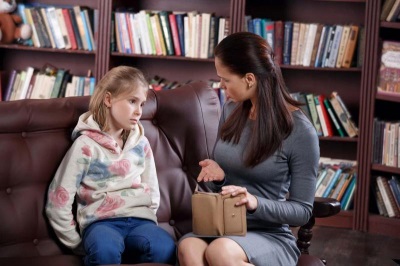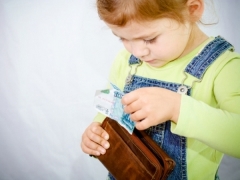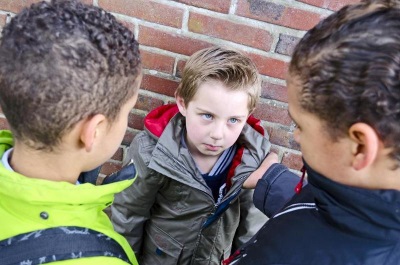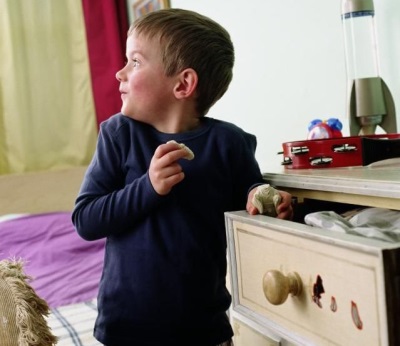What to do if a child steals money from his parents: advice from a psychologist
The theme of theft is relevant in many families. Even the most educated children steal. This problem is little studied, the fact of theft can be identified in a prosperous family.
Parents' feelings: shock, embarrassment and shame - this is the first reaction. Often the problem is hushed up, hidden. A child is reproached, a criminal future is prophesied, or even subjected to physical punishment. In fact, in most cases, not everything is so scary. It is up to the reaction of the older family members that it directly depends whether the action will repeat or not, whether it will be fixed in the mind of the little person.
In three years, the baby begins to separate his "I" from his parents. Self-awareness, understanding of "mine - someone else's" is developing.
Age is proof that he understands a bad deed. Although there are cases when in five years the crumb gives a report to his actions, and at seven does not realize that he has appropriated someone else's. Everything is individual, requires close attention and qualified assistance.
Took without asking a thing: reasons
Asocial behavior often occurs in responsible, weak-willed children who are not inculcated with values, did not explain the difference between theirs and others. Do not forget, the first teachers are parents, and only after is society.
If a son got into a bad company to prove his authority, he is capable of much. If at home there are no business to his hobbies and problems and he is rejected, the child goes to seek solace on the street.
We understand motives, if a child steals both at school and at home
- The remorse of conscience is great, but the desire to possess someone else is much stronger.
- Dissatisfaction - psychological and / or material. (Perhaps his ideas about the necessary are different from yours).
- Insufficient understanding of morality and strength of will.
A person of any age is capable of a wrongful act. If he wants something very much, he can yield, justifying his own weakness, inventing various excuses. Such thefts have a single character and remain without consequences. The culprit suffers remorse of conscience, hides even from relatives, does not use the trophy - throws it away or hides.
- If friendly and outspoken kids suddenly steal something, they especially need help. With the help of the conversation, parents must eliminate material gain and revenge. The usual scenario: the child can not explain why. Relatives are upset that the culprit is deceiving. They wait and even demand repentance. But the more aggressive the methods, the thicker the wall, and the farther you are from the truth. Often the problem of theft first manifests itself at a very early age. Then the guilty are punished, without clarifying the essence of why it happened. And in the 13-14 years the situation is exacerbated with new force.
Think about your own relationships, negative changes (divorce), enmity and cold - everything affects your baby. Start with yourself, improve the atmosphere in the house. Little desire to change his son, you need to pull yourself together, shout less and show more love.
- Revenge. Things disappear from classmates to whom there is envy. Such "trophies" hide, no material benefit. With the help of illegal actions a schoolboy increases his importance in his own eyes. Of course, he is not popular in school. If you recognize your child in this paragraph - praise him. For everything, for any good deed, praise immensely, he lacks this.Establish a trust relationship. Do not set a material mark for achievement, no money for marks. Your child is lacking emotional intimacy and self-reliance, not money.
- Moral education. The culprit does not think how badly others are upset, he is not worried about the possible consequences. It happens when the little man was not explained that he took without asking and the owner would be very upset. It is useful to read, and then discuss thematic tales and stories. This is especially effective in 6-7 years.
In no case do not leave him alone with the act, do not blame or deprive of love. Let him know that everything can be corrected, give a helping hand, teach to bear responsibility, help rehabilitate.
What if a thief is caught?
And if you are not caught, do not blame, and even when you are caught in your hand, control your speech. Accusations, especially baseless, can infer an inferiority complex, sometimes for this one incident is enough. Irreplaceable damage will be caused to his person. Let the baby know that he can fix everything, it will retain his confidence in himself.
After the offense is expected to continue, in every act there is a theft, it pushes for new crimes. Misunderstanding and rejection by households leads to bitterness. And the assignment of things is already becoming not only revenge, but also a way to satisfy material needs.
Features 7 years
Remember that children 5-7 years old are not criminals, they do not steal consciously - they just take them. Baby thinks she has the right to everything she can reach. Everything in this world is "mine" until the household shows the limits of what is permitted. Children who are not told what is right, feel no guilt, only get relief from owning what they want.
If you caught a child stealing at the age of 7, solve this problem with love, offer him your help. Redefine your relationship, assure love. Showed patience will help to quickly deal with the problem.
For you, this is a sign that the student feels deprived, unloved, and the relationship with his parents is weak. Love and recognition - this is the basic need of each person. Their lack will entail serious problems with adaptation in society. The desire to be popular is much stronger than the fear of punishment. At 6–7 years old, boys and girls become addicted to peer relations. For example, a son can win the favor of friends, buying sweets for them, and stealing money from you. In this case, teach him to be friends, think of how you can interest classmates.
Features of adolescence
At the age of 8, 9, and 10 years, theft occurs due to insufficiently developed willpower. He just can not resist, although there is shame for actions. In 8 years already have responsibility for themselves, children become more independent. The desire to join the team, to be in the peer group is very strong. It seems to them that they are deprived if classmates have something that they do not have. Then thefts occur because of the need to be “like everyone else” or to compete with your comrades. In this case, the child can steal not only at home, but also in stores.
Tips for parents:
- Develop independence in your child, let the kid set goals for himself and learn to achieve them.
- Give more freedom, let him do what he already can.
- Discuss the family budget. Come to a compromise, for example, give up something in order to save up for the necessary thing for the child.
- Offer him your own earnings. For example, to distribute newspapers or advertisements, help a couple of hours around the house and get extra money for it.
Teenager
In adolescence theft among children most. After all, it is during this period of their life that many changes are waiting for them, physical, social and psychological.At this age, peer pressure is added to these reasons (perhaps even coercion).
In general, the situation with a teenager is much more serious than with kids. It is not possible to protect him from the "bad" social circle, and persuasions can lead to the opposite result, he simply will not listen to you.
The ideal option is to create a social circle in early childhood. For example, it may be the children of your friends, classmates, or children with common interests. When friends are already there, you can unobtrusively get to know everyone. Invite to visit, if possible, meet with parents.
If the situation is out of control, cases of theft occur more often, and you notice other difficulties in communicating with the child - this is an occasion to contact a specialist, a psychologist.

Prevention: what to do to prevent
As a preventive help will:
- Confidential conversation - share your experiences, discuss problems.
- Direct activity on the interests - sports, drawing, photography. He will meet like-minded people in the classroom, he will feel happy, busy and fit.
- Do to others the way you want them to do to you - this is the golden rule for every person. It will teach to empathize and think about the feelings of other people.
- At every age there must be responsibilities, by force, of course. You can be responsible for watering flowers or for going to the store. You decide, but gradually he will take more and more responsibility.
No theft!
- The fear of punishment and sympathy for the sacrifice of many people deters from illegal actions. The most important moral lesson for our children is family. It is the behavior of loved ones, your own example of mother and father, that teaches how to prioritize.
- Do not let the will of anger - By this, you deprive your baby of confidence, and in the future, deprive him of normal relationships with people.
- Beating, physical punishment, and even threatening to hand over to the police - will harden, anger children, they will live in full confidence that they are vicious.
- Share the responsibility, show that his act upsets you, but at the same time make it clear that you will not leave in the lurch. The best medicine is a heart-to-heart talk, a discussion of your feelings.
- Get to the bottom, find out the real causes of what is happening. There may be a serious problem behind the incident.
- Do not order, look for a way out together. Of course, the stolen must be returned. But a son can count on your support. Bring the thing together, in extreme cases, enclose it unnoticed by the owner.
- Temptation. Do not keep money in prominent places. Teach how to properly manage their own funds.
- Praise for honesty. The child brought the lost toy - look for the owner. Tell us how happy the baby will be that she was returned. Make it clear that such a reaction you expected, no other could not be.
Lying: how to wean
Lying - This is a sign of a crisis in trust between the beloved crumbs and parents. You need to understand which of the needs trying to satisfy the baby with a lie. This may be a developed imagination, lack of attention or fear of punishment, the fear that parents will stop loving.
The following actions will help you:
- Resolve internal conflict, help correct the situation. Become an ally, teach to solve emerging problems.
- Do not try to completely control the child. Total control will cause a desire to step back, protest and lie even more.
- Separate reality and fiction. Suggest to compose a fairy tale together if your kid has a violent fantasy. Make sure he understands the difference between reality and a fairy tale.
- Show everything by example. Do not give empty promises, do not be fooled. You are an example for your children, well, if it is positive.
- Do not press on a teenager, expand his personal boundaries. Highlight the "credit" of trust. Let him feel independent.
- Theft and lie are different outcomes of similar problems in many respects. Often they accompany each other. In any case, the one and the other is a serious signal for parents. Do not let the situation take its course: you and your children have the right to be happy, self-sufficient people.
Make it a rule not to punish the truth. Discuss the situation, explain how to act. Emphasize your unconditional love and readiness to help in any situation.
Psychological advice to parents when a child steals money from parents, see the following video.






















